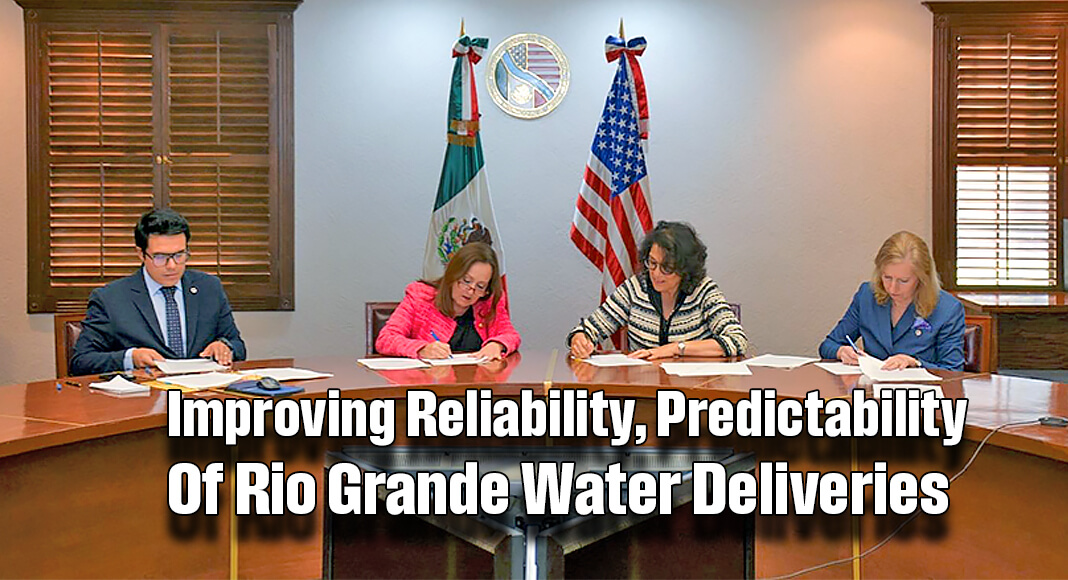
Texas Border Business
The United States and Mexico have signed a Rio Grande agreement aimed at ensuring more regular water deliveries from Mexico to the United States. This International Boundary and Water Commission (IBWC) Minute No. 331, “Measures to Improve the Reliability and Predictability of Rio Grande Water Deliveries to Benefit the United States and Mexico,” provides Mexico with tools and flexibility to deliver water earlier in the five-year cycle under the 1944 U.S.-Mexico water treaty.
A key feature will allow Mexico to use the tools at any time to reduce or prevent shortfalls in water deliveries to the United States, subject to prior U.S. agreement. The Minute, which comes amid growing water scarcity on both sides of the Rio Grande, recognizes the importance to the United States of incorporating Texas water deliveries in the annual allocation plans of Mexico’s water managers. Some of the agreement’s pilot programs will sunset after five years, unless the two governments choose to extend them.
The U.S. Government is already consulting with Mexico to ensure the earliest possible use of the
Minute to deliver water to the United States during the current rainy season. Over the longer term, the two governments expect a Projects Work Group created under the Minute to develop water conservation for the benefit of both countries, as our two countries have done successfully in the Colorado River basin.
The agreement benefits both the United States and Mexico, providing options for avoiding the
recurring crises at the end of five-year water cycles. The Minute is the result of over 18 months of negotiations, and a binational initiative dating back to October 2020. At that time, the United States and Mexico signed IBWC Minute No. 325, successfully concluding a five-year water cycle without a deficit, while committing our governments to developing a new Minute to ensure more predictable and reliable water deliveries.
U.S. IBWC Commissioner Maria-Elena Giner said:
“The last thirty years of managing over-stretched water resources in the Rio Grande basin have
produced broad agreement that the status quo was not acceptable. With the signing of this Minute, Mexico has tools for more regular water deliveries that can be applied right away. Our work will continue to bring predictability and reliability to water deliveries. I want to thank Valley agricultural and municipal water users for our countless consultations and their advocacy for needed changes.”
Assistant Secretary of State for Western Hemisphere Affairs Brian A. Nichols said:
“The U.S. Government welcomes the Minute, a key step in facilitating more regular Mexican water deliveries. The job is not done – the United States continues to consult with Mexico on the best ways to use the tools created in this agreement and deliver badly needed water at the earliest possible date.”
U.S. Ambassador to Mexico Ken Salazar said:
“Beyond being the world’s number one trading partners and sharing enduring cultural and familial ties, the United States and Mexico share important natural resources in the Rio Grande (Rio Bravo) basin. This agreement is the result of the historic cooperation between our countries to resolve our shared challenges. The agreement outlines our joint commitment to responsibly and sustainably manage these important water resources in a way that better meets the needs of agricultural users, communities, and the natural environment on both sides of our shared border.”
Rio Grande Joint Venture Coordinator Karen Chapman said:
“The Rio Grande Joint Venture partnership has long supported efforts to conserve Rio Grande basin ecosystems and the rich natural and cultural heritage they represent. Minute 331 provides avenues for scientific and civic society conservation partners to collaborate with the public sector on projects that will help ensure the long-term sustainability of the Rio Grande, and we applaud the International Boundary and Water Commission for taking this important step forward.”
Under the 1944 U.S.-Mexico water treaty, Mexico delivers water to the United States in the Rio
Grande in cycles of five years, for a minimum annual average of 350,000 acre-feet except in the
event of extraordinary drought or serious accident to its water infrastructure. During the current
cycle, which began on October 25, 2020, Mexico has delivered a total of 425,405 acre-feet.
Mexico’s obligation under the treaty is to deliver 1.75 million acre-feet by October 24, 2025, absent extraordinary drought or a serious infrastructure accident.
In addition to provisions related to water deliveries, the Minute establishes a Rio Grande
Environment Work Group to address environmental aspects in the international reach of the Rio
Grande, and formalizes the Lower Rio Grande Water Quality Initiative to address water quality
concerns, especially salinity. Minute No. 331 was signed on November 7, 2024, in Ciudad Juarez, Mexico, and approved by the two governments. The Minute includes pilot provisions, such as those related to water deliveries, with a duration of five years as well as other provisions with no expiration date.
Information Source: This International Boundary and Water Commission (IBWC)














